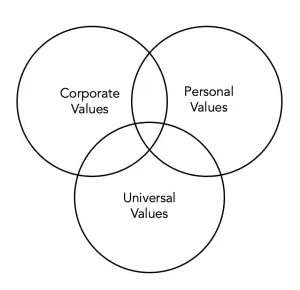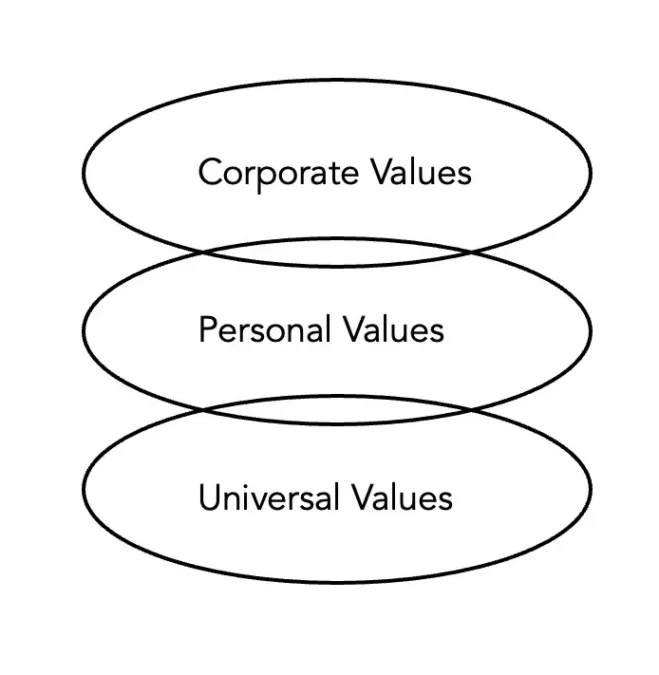I am fascinated by the concept of values and their different types; particularly how they affect our character, decision-making and leadership. The more I explore this topic and implement the lessons, the more I am convinced of the importance of understanding values at every level, from the individual to the global.
In my own learning journey, I have discovered the impact of knowing my core values and applying that to my life choices. As a coach, I have witnessed the transformation that exploring personal values can have; seeing people gain a deeper understanding of themselves and others. As a leader, I have seen the impact of leading authentically, by my principles, and the transformation of groups into high-performing teams, when they properly understand and behave according to their shared values.
I have also witnessed first-hand the friction when people breach universal values on the international stage and the terrible conflict that results. Now, as we live through yet another terrible war in Ukraine, it is important to reflect on what these values are and how we should respond. Not only that, there are other crises, such as environmental change – wicked problems – that require a principled approach if we are ever going to tackle them.
An overview of what values are
This specific post looks at the different levels of values and brings together the differing perspectives, paradigms, and insights that I have shared in the most recent ten articles in my Leadership Unlocked column. This post provides an overview of the topic as well as embedded hyperlinks to help you explore in more depth any area that particularly piques your interest.
The different types of values
Firstly, we should ask the question, what are values? Among other things, values are principles, standards, judgements, beliefs, and priorities. They are things we give worth, a concept that is explored in How We All Worship Something (and Why That’s Important).
Broadly, values can be categorised into three types:
- Personal values
- Corporate values
- Universal values
These different types of values tend to overlap and have some commonalities but the way these values are expressed and prioritised is often subtly different at each level. These can be visualised as overlapping spheres or ellipses, as in the diagram below.

Different typoes of values and how they overlap
Let’s look at each type of value in turn:
Personal values
Personal values are the specific combination of values that best reflect our character and preferences. For example, these could be compassion, courage, honesty, or any number of other virtues. For me, adventure and inquisitiveness are core personal values.
Finding your personal values is an important part of self-awareness. As the Greek philosophers said, the starting point of wisdom is to know thyself. Self-inquiry is the start of self-improvement, as explained in Why Socrates is the Father of Self Improvement.
Our values reflect our sense of identity. If we are not true to our values we become inauthentic – an imposter – as explored in How to Smash Imposter Syndrome: Don’t Be a Job Title.
Understanding our personal values is also important in terms of mental health and physical wellbeing. Our values help us to gauge our performance and energy levels, as seen in Burnout Prevention: How to Monitor the Essentials.
And once we find our personal values, we become better at achieving things; we align ourselves to our values to achieve our targets. In other words, to achieve your aim you need to know and apply your principles.
But it does not stop there. We need to constantly re-examine our values. We change and our situation changes. These changes can cause misalignments between ourselves and these actions. This can lead to feelings of frustration and unhappiness, as I have experienced and shared in My Mid-life Crisis and How to Re-find Happiness.
Corporate values
Corporate values are the precepts we hold in common within a family, team, organisation, or people group. These are the principles that bind a group of people together for a particular purpose.
Many organisations have statements that include values such as integrity, creativity, and collaboration. These values should be visible in the behaviour of an organisation, as explained by the Iceberg Model of culture.
If organisations don’t take their values and culture into account then things can go very wrong, especially when they are implementing change programmes, as explained in How to Stop Culture Eating Your Strategy for Breakfast.
Universal values
Universal values are core virtues that transcend individuals, organisations, and national borders. Examples of these would include those enshrined in the United Nations Charter, such as peace, freedom, equal rights, and human dignity.
We often examine values through a very personal lens, and this is important, but this can often limit our ideas of success, both in time and level of impact. Values or virtues should help us define what achievement really means. This success goes beyond just us as individuals as none of us can live a life without interacting with and influencing others. Therefore, we cannot examine values in isolation. Personal values are nothing without the context of corporate and universal values.
There can often be a difference between how we try to sell ourselves – through our CV or on social media – and what really matters when we consider the perspective of universal values. What does success actually mean in this life? The author David Brooks challenges the question “what do I want from life?” and asks another question, “what does life ask of me?” This challenging idea is explored further in What is the Difference Between Eulogy Virtues and Resume Values.
How values can reveal your personal purpose
Here is another way to look at the three types of values (personal, corporate, and universal) intersect. This time we have three overlapping circles.

Where values overlap can give us insight to our purpose
Each of us has a unique expression of how and where these circles meet. When you have explored and understood each different sphere you should have a better idea of where and how the values overlap.
Why is that important? Well, this intersection can give us a great insight into the specific role we can play, and the special impact that we can bring to the world. We may not feel we can change the whole world, but we can certainly change our world; the environment and the community we live in. This opportunity, where our values align and can bring the greatest impact, can reveal our personal or life purpose.
So, what is that place for you?





